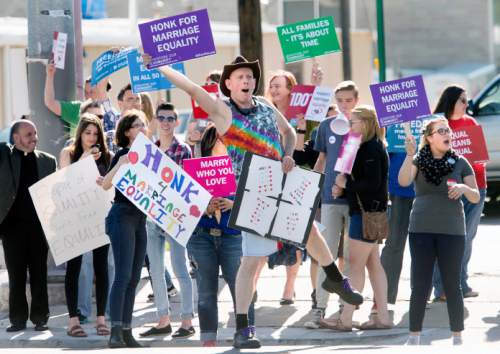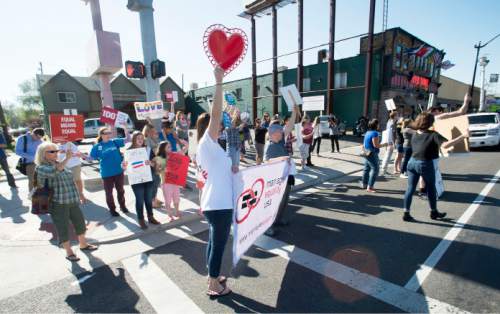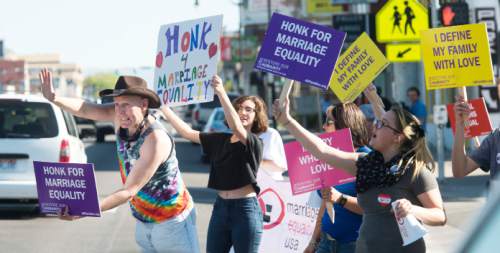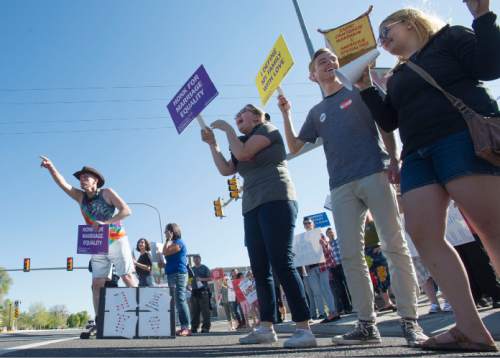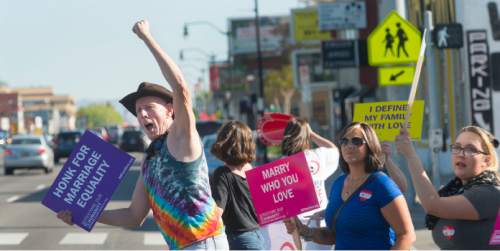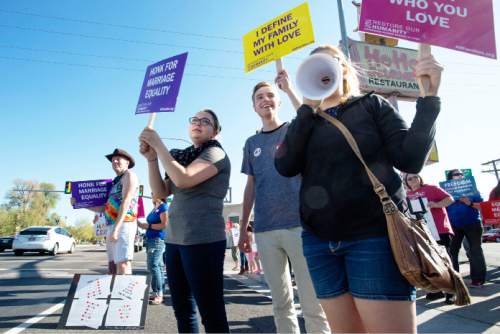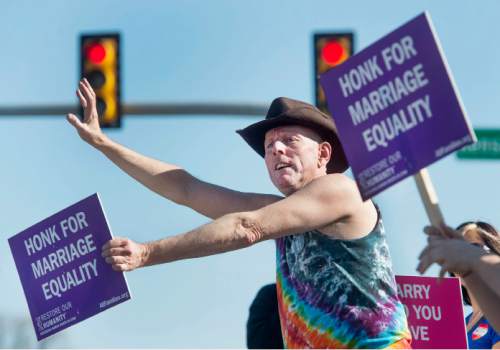This is an archived article that was published on sltrib.com in 2015, and information in the article may be outdated. It is provided only for personal research purposes and may not be reprinted.
Two weeks ago, when someone asked Peggy Tomsic if she felt she should be the attorney to argue for marriage equality before the U.S. Supreme Court, her answer was: No, not really.
But on Tuesday, when she began listening to the audio recording of the same-sex marriage case before the nation's high court, Tomsic — who represented the plaintiffs in Kitchen v. Herbert, the 2013 case that legalized same-sex marriage in Utah — had a change of heart.
"I so wanted to be there answering the questions," she said. " … I'm prepared to answer the questions."
Many had expected it would be Tomsic — and Utah's case — that would take the question of same-sex marriage to Washington, D.C.
Utah's ban on gay marriage was the first in a string of state laws to be deemed unconstitutional after the 2012 Supreme Court ruling that struck down the Defense of Marriage Act.
The high court previously let those rulings stand, and gay marriage is now legal in 37 states and the District of Columbia.
On Tuesday, the court heard oral arguments in a consolidated case from the 6th U.S. Circuit Court of Appeals, where judges upheld laws in Kentucky, Michigan, Ohio and Tennessee, which bar same-sex unions.
The two main questions before the court: Does the 14th Amendment require a state to license marriages between individuals of the same sex, and are states required to recognize same-sex marriages legally performed in other states. A decision is expected in June.
Utah attorneys Christopher Wharton and Paul Burke were in Washington for the hearing and listened to the arguments from the court's lawyers' lounge.
"I would say that today was the day that the arguments against same-sex marriage dissolved under questioning from the court," said Burke, who represents the Utah Pride Center and got in line at 4 a.m. for a spot in the standing-room only lounge.
Justices posed tough questions to attorneys on both sides of the issue, but the states fighting to preserve their marriage bans were hard-pressed to explain to how the same-sex unions which have occurred nationwide — and the second-parent adoptions of their children — could be undone, or how a marriage could be recognized in one state, but not in another, Burke said.
"I don't see any path for the court to sidestep the ultimate issue," Burke said. "If they answer the first question in the affirmative, then there's a right to same-sex marriage in every state. If they say no, they still have the second question."
And a "yes" there — to recognizing the already-married same-sex couples even in states where such unions are illegal — would provide a "de facto" legalization of same-sex marriage for the country, Burke said.
Burke said he also thought that the question of whether gay rights and religious liberties — a key concern in deeply religious Utah — can be balanced was also answered by the court Tuesday when Justice Ruth Bader Ginsburg reminded her fellow justices that under the First Amendment, no faith leader can be forced to perform a wedding.
"The point was made," Burke said, "that religion and equality for lesbian, gay, bisexual and transgender people can coexist."
Bill Duncan, director of the Sutherland Institute's Center for Family and Society, said in a statement: "Based solely on the questions asked by justices, it's impossible to tell what the final outcome will be."
Some justices seemed to endorse the idea that marriage is just a way for adults to express their love for one another. Others strongly disputed the idea that retaining the virtually universal understanding of marriage — a union between a man and a woman, which is ideal for rearing children — is irrational, Duncan said.
"One theme emerged strongly in the arguments — ideas matter," added Duncan, who also listened to the courtroom audio. "And when the government endorses the idea that marriage is solely about adult desires, that endorsement will have consequences."
Tomsic said she heard few surprises in the arguments and that despite feeling some worry about how the justices might rule, she comes away feeling excited that the same-sex marriage issue has finally had its day in the top court.
"People who believe in the LGBT community have finally had an opportunity, on a national stage, before the most powerful court in America, to argue their position," she said. "And to have it be with a backdrop of over 60 percent of the population being in favor of same-sex marriage, to me that's something that many of us never thought would happen."
Here are other reactions to the hearing from Utah organizations and individuals invested in the same-sex marriage debate:
Equality Utah Executive Director Troy Williams:
A ruling in favor of the plaintiffs will bring the freedom to marry to all 50 states. The stakes couldn't be higher. Every committed same-sex couple should enjoy the same rights and liberties as our heterosexual counterparts. Our nation will become a more perfect union when all Americans enjoy the freedom to marry who they love.
Same-sex couples can marry in nearly three-fourths of the country, but 13 states still ban marriage for same-sex couples. This patchwork of marriage discrimination in America is unsustainable, burdening businesses as well as families.
It's time now for the Supreme Court to finish the job and bring liberty and justice to all.
Utah Attorney General Sean Reyes:
Finally, the Supreme Court of the United States can put to rest the unanswered questions of United States v. Windsor (2012) regarding a state's power to define marriage in our federal system and whether any state must, in all cases, recognize marriages performed in any other state. Although Utah's case is not one of the four cases heard, Kitchen v. Herbert was necessary in the national dialogue to resolve unsettled law. We are pleased that the court has chosen to hear arguments on this historic challenge and to ultimately make it possible for all citizens to have clarity and resolution.
Restore Our Humanity Director Mark Lawrence:
Today, the Supreme Court moved to close the final chapter on a story that began 46 years ago in a bar in New York called the Stonewall Inn. That story took nearly 50 years to write, and was written by hundreds, if not thousands, of people. Restore Our Humanity is honored to be a small part in one of the greatest stories of our time, and we are confident that the Supreme Court will, at last, close this chapter and bring equality and justice to all 50 states in this great nation. We call on all Utahns, our friends and our families to move forward and begin the healing so that we can all live in peace, harmony and equality.
Utah Pride Center Board Chair Kent Frogley:
Today is a historic moment in the fight for marriage equality and LGBTQ rights in the United States. For our community in Utah, this will be a defining moment in the lifelong work towards equality. It is our belief that very soon marriage equality will become a settled question and the law of the land in the entirety of the United States.
Derek Kitchen and Moudi Sbeity, of Kitchen v. Herbert:
We are just very happy and excited that the Supreme Court had a chance to listen to arguments in favor of marriage equality. It's been a long time coming. We only have about a dozen states left and there are a lot of brave and beautiful plaintiffs who made their way to Washington, D.C., today to make their case. We feel very positive and are hopeful that by June all families in these United States will be treated equally under the law.
Utah Sen. Orrin Hatch, R-Utah:
The issue of same-sex marriage involves deeply held convictions on all sides of the debate. While I oppose discrimination on the basis of sexual orientation, I do not support redefining the fundamental nature of marriage as between a man and a woman. But whatever one's personal views on the issue, it is clear that nothing in the Constitution requires states to recognize same-sex marriage. This issue — like so many others — is rightly left to the states and the people to decide. The Supreme Court should not invent a new right to same-sex marriage at the expense of the rule of law. Instead, I hope that the court respects the right of the American people in each state to decide this issue through the democratic process.
Same-sex marriage rallies planned
Supporters and opponents of same-sex marriage are rallying Tuesday in connection with the U.S. Supreme Court hearing arguments on the constitutionality of laws banning such marriages.
Supporters of same-sex marriage are holding a rally around 5 p.m. on State Street near 1500 South in Salt Lake City. They plan to hold signs and encourage drivers to honk in support of gay marriage.
Opponents of gay marriage are holding a 7 p.m. rally at the Utah State Capitol. Organizers are inviting rally attendees to show up at the "Stand for Marriage" rally wearing pink and blue to support laws defining marriage as the union of a man and a woman.
— The Associated Press


